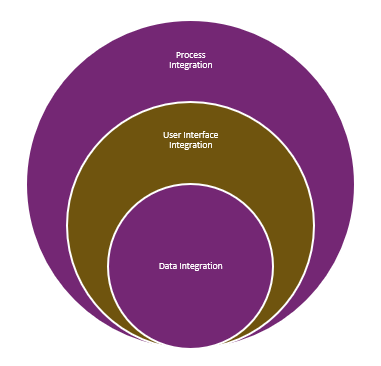Introduction
This module focuses on your integration strategy and how the Integration workshop will help verify that the project's integration plans are comprehensive and will support initial implementation and long-term needs. The workshop's goal is to evaluate the proposed integration plan and provide feedback and recommendations that highlight technical risks and issues and identify best practices.
The Integration workshop should be scheduled and completed during the implementation phase of the project. You can also download examples of templates for this and other workshops.
What integration means
Integration is the connecting of one or more parts or components of systems to create a more unified experience or to ensure a more consistent outcome of a process. Integration allows the use of existing services, internal and external, without having to rebuild or migrate existing functionality.
Different types of integrations that you will use on projects include:
Process integration - Multiple disparate systems, and each system is part of an overall business function.
User interface integration - Visibility of data from one or more systems, without bringing records of data into the system.
Data integration - Combining data from different sources and presenting the user with a unified view.
The actual implementation of integrations can use many different technical approaches, including user interface (UI), file, APIs, Microsoft Power Platform, connectors, and other external ETL tools. Some integrations will also be configurations of prebuilt integrations that are supported by the platform and Microsoft Dynamics 365 applications. Each approach contains factors that you should be aware of as part of the Integration workshop review. These integrations will be covered in detail later.
Understanding the reasons for the integration and the problem that you're trying to solve can help you establish the importance of the integration and the level of risk associated with it. For each integration, make sure that you are clear about what you expect to happen if an integration is unavailable and how you anticipate handling failures.
Integrations can be grouped as essential or convenient. Essential integrations are key to your project's success and ongoing operation. They often involve ensuring data integrity or participation in larger organizational business processes. They can also integrate services that augment the functionality of your core system and handle important logic. For example, an external service might be used to conduct credit scoring to determine whether credit will be issued for an order.
Convenience integrations help make the process easier for users or help improve their productivity. For example, a convenience integration might prevent a user from having to go into a separate application, which allows them to run the integration from within the Dynamics 365 application. While convenience integrations help save time, they also provide an alternate path that users can take to complete the task if the system is down. Mostly, your effort for the Integration workshop should focus on the essential integrations that are critical to your project success.
Similar to all workshops in Success by Design, not every aspect of the Integration workshop will apply to every project. However, it is vital to have a plan and process for managing your idea to deployment process.
Timing of the Integration design review
The Solution blueprint review should always precede the Integration design review. Before delving into integration design-related topics, you need to understand the solution, which will help you determine how integrations will play a part in the solution.
The Integration design review does not provide an overview of how to integrate with Dynamics 365. For that purpose, several Tech Talks have been developed that discuss and exemplify the usage of integration tools and patterns.
The Integration design review workshop should be conducted when the design is near completion, or already completed, and when a solid understanding of how various apps will be integrated while forming the full solution has been reached.
